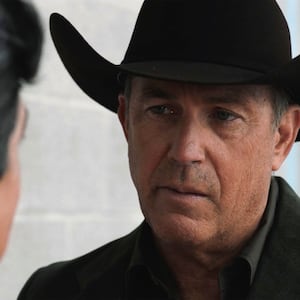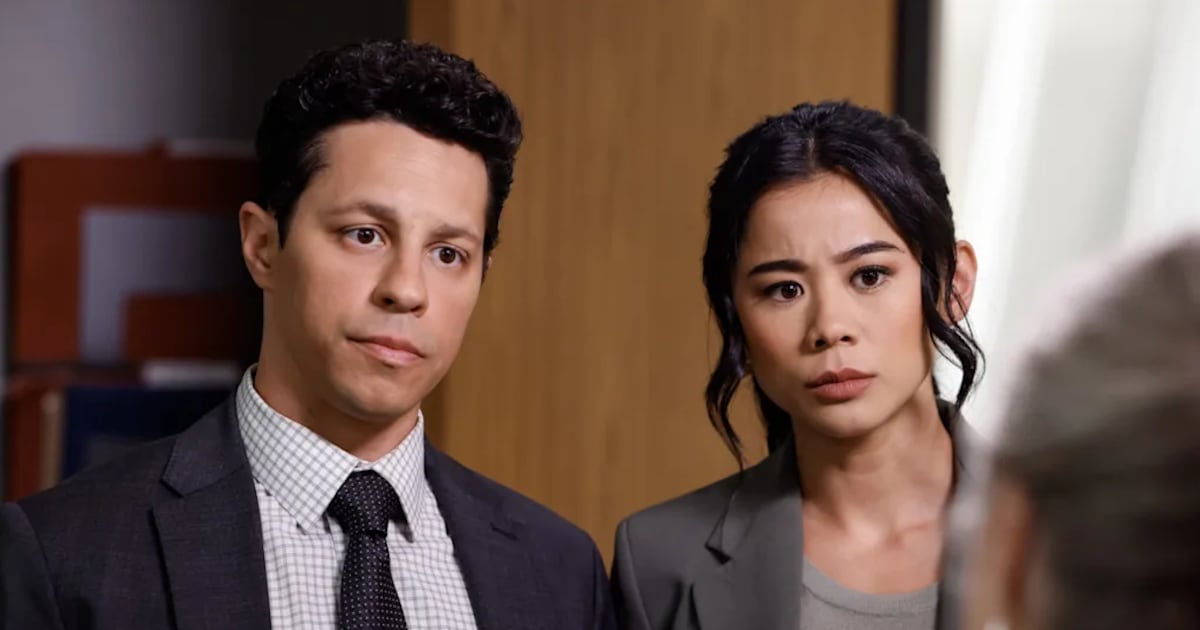Taylor Sheridan is television’s reigning macho melodramatist, and Tulsa King fits neatly alongside his Yellowstone and The Mayor of Kingstown as another soapy crime drama led by a marquee movie star. In this case, that’s Sylvester Stallone, who in his debut small-screen role demonstrates that even at 75 he’s got more charisma than most.
More unexpected, though, is that Sheridan’s latest is less grim and brooding than corny and amusing—a shift that suits Stallone, who’s always been an underrated comedic presence, as well as lending the Paramount+ series (which premiered Nov. 13) its own agreeably distinctive personality.
Simultaneously premiering on the linear Paramount Network, Tulsa King’s first two episodes are co-written by Terence Winter and directed by Alan Coulter, both celebrated Boardwalk Empire veterans who were ostensibly brought aboard by Sheridan to lend the material some gangster authenticity.
Early returns, however, suggest that such contributions are relatively minimal, since the show is less a slice of authentic mob life than it is a borderline-cartoony saga about a mafioso out of water. Culture-clash goofiness is frequently the order of the day, all of it elevated by its headliner, who carries himself like the most self-possessed badass on the planet, and whose intimidating, no-nonsense attitude is punctuated by a sarcastic streak that elicits most of the early laughs.
Stallone is Dwight Manfredi, who after keeping his mouth shut in prison for 25 years, walks free and, for his loyalty and silence, is unceremoniously told by his Italian mafia godfather Pete (A.C. Peterson) that he’s no longer welcome in New York. His new home will instead be Tulsa, an Oklahoma metropolis that’s supposedly ripe for criminal exploitation.

Domenick Lombardozzi and Sylvester Stallone in Tulsa King.
Brian Douglas/Paramount+While he isn’t happy about it—and lets it be known to Pete, his underboss son Chickie (Domenick Lombardozzi), and capo Vince (Vincent Piazza), the last of whom gets knocked out by Dwight for talking smack—Dwight accepts his post and, in the blink of an eye, is touching down in the Sooner State. Upon arrival, he instantly locates a driver in cabbie Tyson (Jay Will), who’s eager to ditch his day job and offer guidance to Dwight, a poised heavy who’s unfamiliar with this new 21st-century world.
Much of Tulsa King’s maiden installments revolve around Dwight’s acclimation to an American society he doesn’t recognize. He bristles when Tyson affectionately calls him a “gangster.” He marvels at Apple stores and pedestrians on scooters. He’s astonished that some businesses won’t accept cash, and he’s frustrated when a bank requires ID verification in order to set up an account that will net him a debit card.
And in a second-episode scene that feels tailor-made to please Sheridan’s conservative-skewing fanbase, he finishes off a rant about the country’s evolving landscape (and his feeling that he’s now akin to Rip Van Winkle) with the declaration that his pronoun is “It. As in, it can’t take this shit anymore.” As with Kevin Costner’s Yellowstone paterfamilias John Dutton, Stallone’s protagonist longs for—and represents—the good ole days, when men were men, women were women, and thuggish crime paid handsomely.
With regards to the last of those, Dwight discovers that things haven’t changed all that much. Hearing that medical marijuana is now legal, Dwight has Tyson take him to a dispensary run by Bodhi (Martin Starr), a mild-mannered stoner who’s forced to fork over 20 percent of his profits for protection—this despite the fact that there are absolutely no threats to his ramshackle (if lucrative) operation.

Sylvester Stallone and Martin Starr.
Brian Douglas/Paramount+Dwight strong-arms his way into the weed trade, sets up residence at a swanky hotel, and visits a honky-tonk saloon, where he meets ex-bull rider bartender Mitch (Garrett Hedlund). Mitch is a fellow ex-con who respects Dwight’s ability, regardless of his outsider status, to get along with the locals. While out, he also charms Stacy Beale (Andrea Savage), although their one-night stand ends badly once she finds out Dwight’s age.
Tulsa King swiftly sets up its forthcoming conflicts, which stem from Stacy’s job as an ATF agent, Vince’s desire for retribution against Dwight, and a local farmer named Manny (Max Casella) who’s perturbed by Dwight’s appearance in this out-of-the-way locale—likely because he’s in hiding (perhaps via witness protection).
Concurrently, it concocts a raft of underlying father-child frictions involving Dwight, Mitch, and Tyson that are supposed to deepen the characters but mostly come across as standard-issue hang-ups. No one is tuning in to see Stallone cry over his parental mistakes, and those moments are thankfully brief, overshadowed by Dwight’s efforts to establish himself as a big fish in a small pond, where he stands out thanks to his designer jacket, dark sunglasses, and hulking frame.

Vincent Piazza and Sylvester Stallone.
Brian Douglas/Paramount+Stallone is clearly enjoying playing Dwight, who’s been imagined as the coolest, toughest, and smartest guy in any room. Introductory shots indicate that he spent his time behind bars reading Middlemarch, Faust, and Othello, and he routinely surprises others with his astute intellect and cultural and historical knowledge, be it a reference to the “Rubicon” or tangents about Arthur and Henry Miller.
More important still, he has “integrity” because he’s the kind of guy who punches out louts who disrespect women and then gives those ladies the coat off his back. He’s basically America’s classiest and most honorable gangster, and Stallone embodies him with a dignified bravado that’s more funny than fearsome.
Landing in Tulsa, Dwight is promptly greeted by an enormous grasshopper that causes him to exclaim, “That thing’s the size of my cock!”—a comment that earns him a spray of holy water by one of the Bible Belt’s myriad true believers. Regardless of its grittier gangster-saga pretentions, that’s about as serious as Tulsa King gets.
At least at the outset, such an approach serves Stallone and the series well, its joviality alleviating the story’s clichéd elements. It’s not yet clear if Sheridan intends for levity to be the proceedings’ driving force, or merely an embellishment for a formulaic tale of a bad man making good in a foreign environment. Yet given that Stallone is a natural at being not only commanding but sardonic and self-deprecating, leaning into the lighthearted certainly seems like the most promising path forward.








